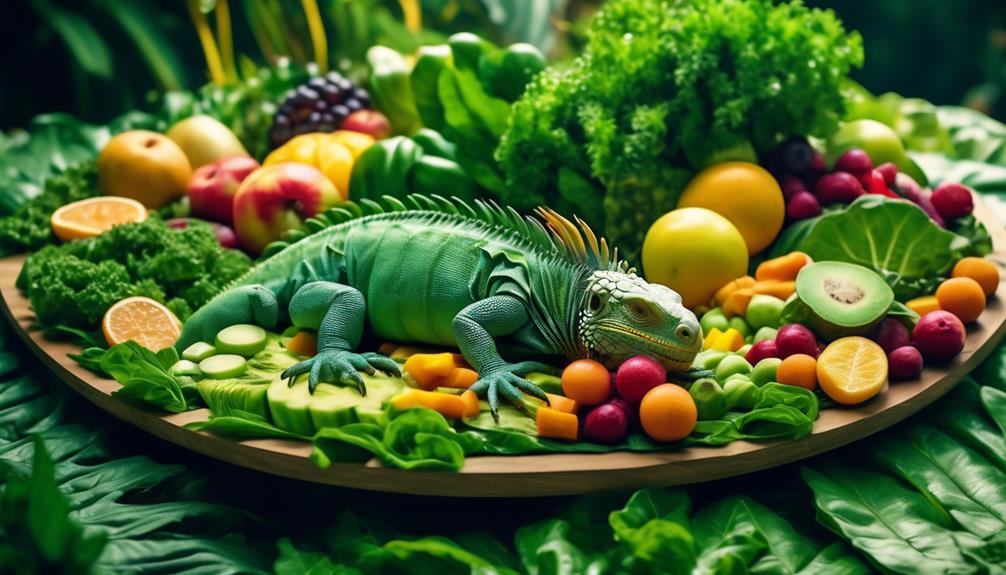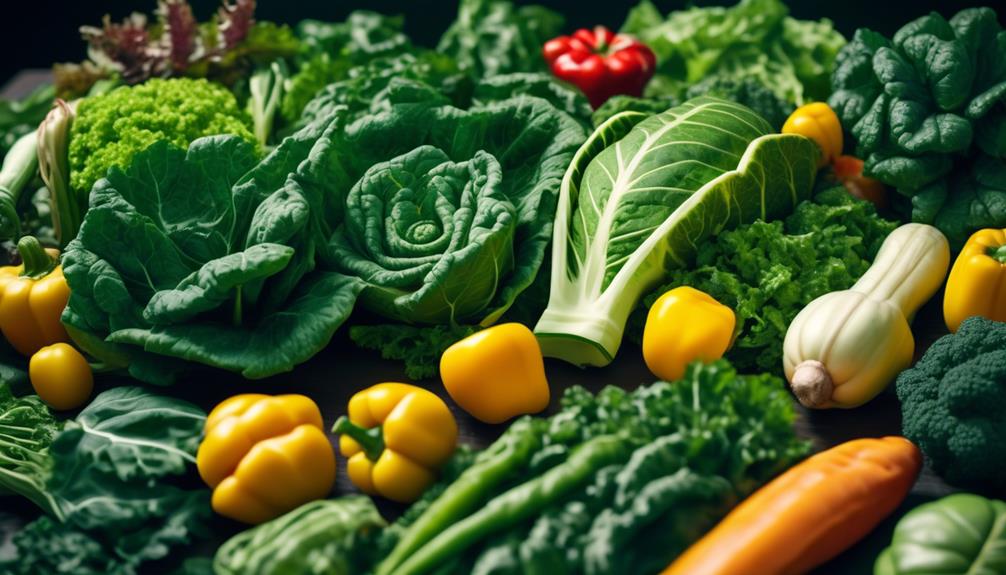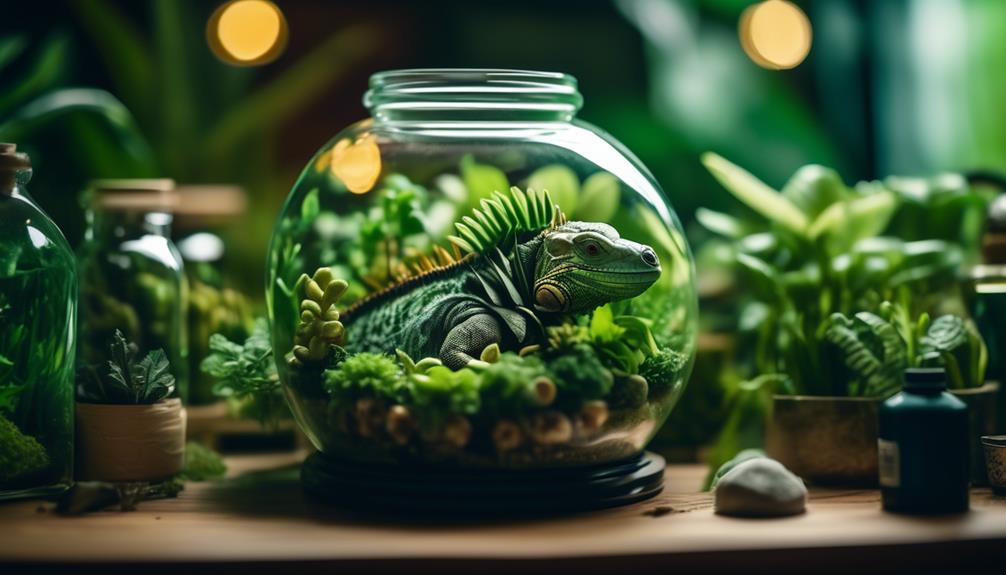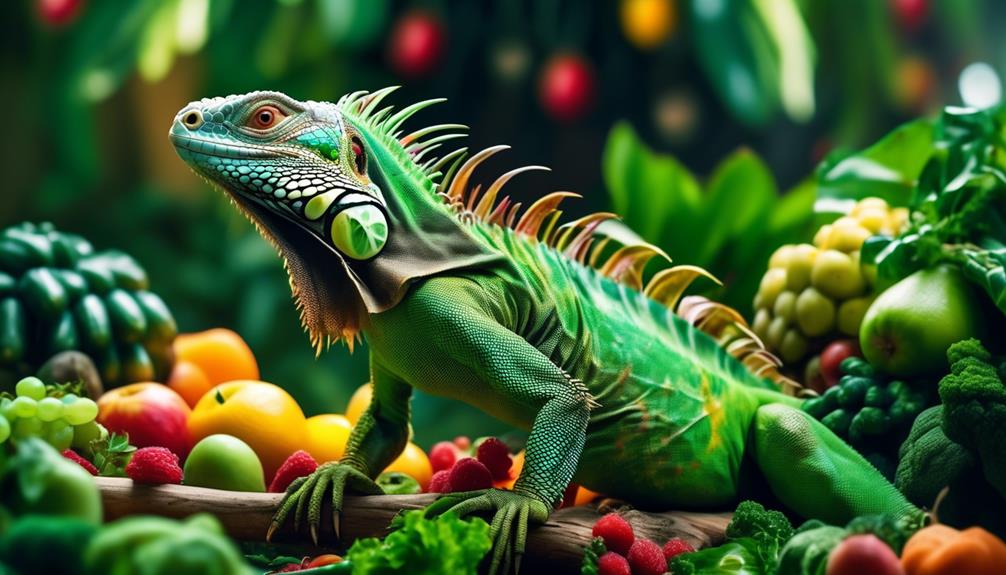By sheer coincidence, we stumbled upon a fascinating topic that we just couldn't resist exploring – the perfect diet for green iguanas.
Now, you might be wondering, why is it so important to find the ideal diet for these scaly creatures?
Well, let's just say that it's not just about keeping them well-fed but also ensuring their overall health and happiness.
Trust us when we say that what we're about to reveal will make you rethink everything you thought you knew about feeding green iguanas.
So, get ready to uncover the secrets to a thriving and contented iguana – you won't want to miss this!
Key Takeaways
- Green iguanas should be fed daily, regardless of age, with baby and juvenile iguanas requiring daily feeding.
- It is important to chop the food into appropriate sizes and provide a variety of vegetables to ensure a balanced diet.
- Avoid feeding green iguanas foods that are high in oxalic acid, high in phosphorous, or goitrogenic as they can inhibit calcium and iodine absorption.
- Supplements, specifically reptile-specific calcium and multivitamin powders, should be used to ensure proper bone health and overall nutrition.
Feeding Recommendations for Green Iguanas

Feeding recommendations for green iguanas include offering food daily, regardless of their age. Older iguanas may eat less and can occasionally skip a day, while baby and juvenile iguanas should be fed daily.
It's important to properly chop food for green iguanas to ensure they can easily consume and digest it. The size of the food should be appropriate for their mouth and digestive system.
Additionally, calcium supplementation is crucial for green iguanas. Calcium is essential for their bone health and overall well-being. Without adequate calcium, green iguanas are at risk of developing metabolic bone disease. Therefore, it's important to provide calcium supplements in their diet.
Foods to Avoid for Green Iguanas
To ensure the optimal health and well-being of green iguanas, it's important to be aware of the foods that should be avoided in their diet.
Firstly, oxalic foods should be restricted as they have the ability to bind calcium, which can lead to metabolic bone disease. Examples of oxalic foods to avoid include spinach, beet greens, and rhubarb.
Secondly, goitrogenic foods should be limited as they can inhibit iodine absorption and cause thyroid gland malfunction. Cruciferous vegetables such as cabbage, broccoli, and kale fall into this category.
It's crucial to note that a lack of calcium can result in metabolic bone disease, while a lack of iodine can lead to thyroid gland malfunction.
Recommended Vegetables for Green Iguanas

A varied and nutritious vegetable diet is essential for the optimal health and well-being of green iguanas. Leafy greens, turnip greens, and shoots are highly recommended for their numerous benefits. These vegetables are low in fat and sugar, but high in vitamins and minerals, making them an ideal choice for iguanas. Leafy greens, such as kale, collard greens, and mustard greens, are particularly beneficial as they provide essential nutrients and hydration. To properly prepare vegetables for iguanas, they should be chopped into appropriate sizes to facilitate easy consumption. It is also important to provide a variety of vegetables to ensure a balanced diet. Commercially prepared diet products can be used as supplements to provide additional nutrients and variety. Incorporating these vegetables into a green iguana's diet will promote overall health and support their specific dietary needs.
| Recommended Vegetables |
|---|
| Leafy greens |
| Turnip greens |
| Shoots |
| Other vegetables |
Fruits for Green Iguanas
Fruits play a supplementary role in the diet of green iguanas, providing essential vitamins and hydration alongside their main vegetable intake. While vegetables should make up the majority of their diet, fruits can offer additional nutritional benefits.
Fruits are rich in vitamins, such as vitamin C, which is important for immune function and collagen synthesis. They also provide hydration due to their high water content. When introducing fruits into a green iguana's diet, it's crucial to ensure their safety.
Some safe fruits for iguanas include berries, melons, and citrus fruits. It's important to offer a variety of fruits as occasional treats and to avoid feeding fruits high in sugar. Commercially prepared fruit mixes can be used as supplements to provide a balanced diet.
Supplements for Green Iguanas

When considering the nutritional needs of green iguanas, it's essential to address the topic of supplements. These supplements play a crucial role in maintaining the health and well-being of these reptiles.
Here are four key points to understand about supplements for green iguanas:
- Benefits of calcium supplementation: Calcium is vital for the development and maintenance of strong bones in green iguanas. It helps prevent metabolic bone disease, which can lead to deformities and fractures. Calcium supplementation ensures that iguanas receive an adequate amount of this essential mineral in their diet.
- Importance of reptile-specific supplements: Green iguanas require specific supplements tailored to their unique nutritional needs. Reptile-specific calcium and multivitamin powders are recommended to provide the necessary nutrients in the correct ratios for optimal health.
- Use a schedule for supplementing calcium and vitamins: It's important to follow a regular schedule when adding supplements to the iguana's diet. This ensures consistent intake of necessary nutrients and helps prevent deficiencies.
- Use small amounts of supplement powder: Only a small pinch of supplement powder should be used during each feeding. This helps prevent over-supplementation, as excessive amounts can be harmful to the iguana's health.
Frequently Asked Questions
How Often Should I Feed My Green Iguana?
We feed our green iguanas daily, regardless of age. Older iguanas may eat less and can skip a day occasionally. Baby and juvenile iguanas should be fed daily. We chop the food into appropriate sizes for them.
Can Green Iguanas Eat Meat or Insects?
Green iguanas should not eat meat or insects. Their feeding habits are strictly vegetarian. A vegetarian diet provides essential nutrients, supports their health, and prevents potential health issues associated with a carnivorous diet.
Are There Any Specific Fruits or Vegetables That Green Iguanas Should Not Eat?
Foods to avoid for green iguanas include oxalic foods, high phosphorous foods, and goitrogenic foods. These can lead to calcium and iodine deficiencies, causing metabolic bone disease and thyroid gland malfunction. This can negatively impact the iguana's health.
How Can I Tell if My Green Iguana Is Getting Enough Calcium in Its Diet?
If your green iguana is not getting enough calcium in its diet, there may be signs of calcium deficiency, such as weak bones or muscle tremors. Calcium is crucial for their health and should be prioritized in their diet.
What Are the Signs of Metabolic Bone Disease in Green Iguanas?
Metabolic bone disease symptoms in green iguanas include soft or deformed bones, difficulty moving, and swollen joints. Prevention and treatment involve ensuring a proper calcium-rich diet and UVB exposure. Calcium is crucial for the development and maintenance of healthy bones.
Conclusion
In conclusion, providing a healthy and balanced diet for your green iguana is crucial for their overall well-being. By following the feeding recommendations and avoiding certain foods, you can ensure optimal calcium absorption and prevent health issues.
Incorporating a variety of recommended vegetables and fruits into their diet, along with necessary supplements, will promote optimal bone health.
Remember, a well-nourished green iguana is a happy and healthy companion!


